Let's start with Krugman's "When Votes Disappear":
As far as I can tell, the reason Florida-13 hasn't become a major national story is that neither control of Congress nor control of the White House is on the line. But do we have to wait for a constitutional crisis to realize that we're in danger of becoming a digital-age banana republic?
"In danger of becoming..."?!! Okay, it's Thanksgiving weekend, so we'll just be thankful Krugman has decided to finally notice.
He also notes the concerns about the very partisan (natch) Prof. Alec Yasinsac whose been placed in charge of Florida's state investigation despite having "made an appearance on the steps of the Florida Supreme Court during the 2000 recount battle wearing a 'Bush Won' sign," as Krugman reports.
We'll also note that Livermore Labs' Prof. David Jefferson, who spent the last two weeks in Sarasota himself writes in several comments here at The BRAD BLOG that he is more optimistic about Yasinsac and the state investigation over all. Johns-Hopkins computer scientist Avi Rubin reports a similar sentiment on his blog today, defending Yasinsac and concluding about Krugman:
While we certainly hope that the Jefferson/Rubin evaluation/hopes end up being the correct ones, we're not sure they are keeping in mind the necessity of even the appearance of impartiality here.
If Yasinsac's group finds trouble in the machines, great. It can be said that even a tream led by a Republican partisan agreed the machines were to blame. On the other hand, if Yasinsac's group concludes there was no problem with the machines, the analysis will receive no confidence from the general public...where such confidence is much needed right about now.
Yasinsac should recuse himself from the team of analysts for exactly that reason, even if the rest of his team at Florida State University --- whom Rubin regards as excellent --- stay on the job. The same is true, and for the same reason --- as we discussed the other day --- for David Drury, who is also on the team, even though he is the man responsible for certifying these paperless ES&S touch-screen systems in the first place for the state of Florida. A "machines worked fine" conclusion from the team, as long as both Drury and Yasinsac are on it, will be regarded as partisan and/or self-serving. Whether it actually is will be completely beside the point.
Moving on then...Even WaPo's E.J. Dionne is beginning to get it. Today, he writes something remarkably similar to what I wrote for ComputerWorld on the day after the election about the huge bullets that the nation just happened to dodge on November 7th. Here's Dionne this morning...
There's nothing wrong with Sarasota, a lovely place. But if the voting snafus in the contest for Florida's 13th District had hung up either of this year's two closest Senate races, we still would not know which party had won control of the Senate.
Supporters of new voting technologies have been patting themselves on the back, saying there were no big voting problems this year. Let them go to Sarasota.
...
If you believe that these machines operated properly, then you must also believe that I missed my true vocation as an NBA center.
Imagine if 18,000 votes had just disappeared in either of the key Senate races. Or imagine a presidential election in which the electoral votes of Florida were decisive and the state was hanging in the balance by --- to pick a number that comes to mind --- 537 votes. And, by the way, in 2000 we could at least see those hanging and dimpled chads. In this case the votes have --- poof! --- simply disappeared.
He goes on to argue (correctly) that "Sarasota is the canary in the electronic coal mine."
While we might quibble that there is a bloodbath of dead canaries which have long been littering the electoral landscape, we'll shut up today, and again be thankful that someone with a voice at the Washington Post seems to have finally noticed any of this stuff we've been running around with our hair on fire about for the last two years.
Dionne goes on to note another point we've made just once or twice ourselves in the past (emphasis ours)...
And finally, he closes by pointing to the Supreme Court's earth-shattering, and then ever-since-ignored Bush v. Gore decision from 2000:
Bad news, E.J.. It's been happening all across the country ever since. And despite our best efforts, nobody --- not the courts, not the politicians, not the media --- has been willing to do a damned thing about it.
Let's hope that changes. Even if we won't be holding our breath until it does.


 Kamala Rising:
Kamala Rising: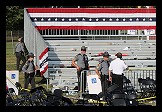 Evidence Fails to Establish Attempted Trump Assass-ination Politically Motivated
Evidence Fails to Establish Attempted Trump Assass-ination Politically Motivated Former MAGA 'Cultist' on the State of the Race for 'MAGA Americans': 'BradCast' 7/23/24
Former MAGA 'Cultist' on the State of the Race for 'MAGA Americans': 'BradCast' 7/23/24  'Green News Report' 7/23/24
'Green News Report' 7/23/24
 Biden Out, Endorses
Biden Out, Endorses BIDEN DROPS REELECTION BID
BIDEN DROPS REELECTION BID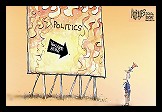 Sunday 'You Are Here' Toons
Sunday 'You Are Here' Toons What J.D. Vance Forgot to Tell You (and Lied About) at the RNC: 'BradCast' 7/18/24
What J.D. Vance Forgot to Tell You (and Lied About) at the RNC: 'BradCast' 7/18/24 'Green News Report' 7/18/24
'Green News Report' 7/18/24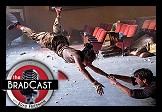 Holding on for Dear Life Amid the Political Whirlwind: 'BradCast' 7/17/24
Holding on for Dear Life Amid the Political Whirlwind: 'BradCast' 7/17/24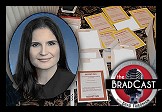 Cannon's Corruption: 'BradCast' 7/16/24
Cannon's Corruption: 'BradCast' 7/16/24 'Green News Report' 7/16/24
'Green News Report' 7/16/24 Amid the Assassination Attempt Aftermath:
Amid the Assassination Attempt Aftermath:
 Meanwhile... : 'BradCast' 7/11/24
Meanwhile... : 'BradCast' 7/11/24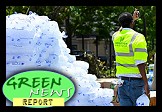 'Green News Report' 7/11/24
'Green News Report' 7/11/24 Paging 'Johnny Unbeatable'! Dems (Actually!) in Disarray!: 'BradCast' 7/10/24
Paging 'Johnny Unbeatable'! Dems (Actually!) in Disarray!: 'BradCast' 7/10/24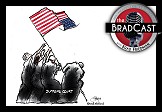 SCOTUS Immunity Ruling 'As Bad as it Sounds', And Worse: 'BradCast' 7/9/24
SCOTUS Immunity Ruling 'As Bad as it Sounds', And Worse: 'BradCast' 7/9/24 So, What Now?: 'BradCast' 7/8/24
So, What Now?: 'BradCast' 7/8/24 Debunking MAGA Cult Xenophobia
Debunking MAGA Cult Xenophobia A Friendly Suggestion: Harris-Newsom 2024
A Friendly Suggestion: Harris-Newsom 2024 Prosecutor: SCOTUS Corruption Ruling Less Corrupt Than Appears: 'BradCast' 6/27/24
Prosecutor: SCOTUS Corruption Ruling Less Corrupt Than Appears: 'BradCast' 6/27/24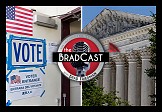 Good News and Bad: At the Polls and From the Corrupted Court: 'BradCast' 6/26/24
Good News and Bad: At the Polls and From the Corrupted Court: 'BradCast' 6/26/24 'Emptywheel' on Assange Hacking, Plea Deal: 'BradCast' 6/25/24
'Emptywheel' on Assange Hacking, Plea Deal: 'BradCast' 6/25/24
 VA GOP VOTER REG FRAUDSTER OFF HOOK
VA GOP VOTER REG FRAUDSTER OFF HOOK Criminal GOP Voter Registration Fraud Probe Expanding in VA
Criminal GOP Voter Registration Fraud Probe Expanding in VA DOJ PROBE SOUGHT AFTER VA ARREST
DOJ PROBE SOUGHT AFTER VA ARREST Arrest in VA: GOP Voter Reg Scandal Widens
Arrest in VA: GOP Voter Reg Scandal Widens ALL TOGETHER: ROVE, SPROUL, KOCHS, RNC
ALL TOGETHER: ROVE, SPROUL, KOCHS, RNC LATimes: RNC's 'Fired' Sproul Working for Repubs in 'as Many as 30 States'
LATimes: RNC's 'Fired' Sproul Working for Repubs in 'as Many as 30 States' 'Fired' Sproul Group 'Cloned', Still Working for Republicans in At Least 10 States
'Fired' Sproul Group 'Cloned', Still Working for Republicans in At Least 10 States FINALLY: FOX ON GOP REG FRAUD SCANDAL
FINALLY: FOX ON GOP REG FRAUD SCANDAL COLORADO FOLLOWS FLORIDA WITH GOP CRIMINAL INVESTIGATION
COLORADO FOLLOWS FLORIDA WITH GOP CRIMINAL INVESTIGATION CRIMINAL PROBE LAUNCHED INTO GOP VOTER REGISTRATION FRAUD SCANDAL IN FL
CRIMINAL PROBE LAUNCHED INTO GOP VOTER REGISTRATION FRAUD SCANDAL IN FL Brad Breaks PA Photo ID & GOP Registration Fraud Scandal News on Hartmann TV
Brad Breaks PA Photo ID & GOP Registration Fraud Scandal News on Hartmann TV  CAUGHT ON TAPE: COORDINATED NATIONWIDE GOP VOTER REG SCAM
CAUGHT ON TAPE: COORDINATED NATIONWIDE GOP VOTER REG SCAM CRIMINAL ELECTION FRAUD COMPLAINT FILED AGAINST GOP 'FRAUD' FIRM
CRIMINAL ELECTION FRAUD COMPLAINT FILED AGAINST GOP 'FRAUD' FIRM RICK SCOTT GETS ROLLED IN GOP REGISTRATION FRAUD SCANDAL
RICK SCOTT GETS ROLLED IN GOP REGISTRATION FRAUD SCANDAL VIDEO: Brad Breaks GOP Reg Fraud Scandal on Hartmann TV
VIDEO: Brad Breaks GOP Reg Fraud Scandal on Hartmann TV RNC FIRES NATIONAL VOTER REGISTRATION FIRM FOR FRAUD
RNC FIRES NATIONAL VOTER REGISTRATION FIRM FOR FRAUD EXCLUSIVE: Intvw w/ FL Official Who First Discovered GOP Reg Fraud
EXCLUSIVE: Intvw w/ FL Official Who First Discovered GOP Reg Fraud GOP REGISTRATION FRAUD FOUND IN FL
GOP REGISTRATION FRAUD FOUND IN FL


































